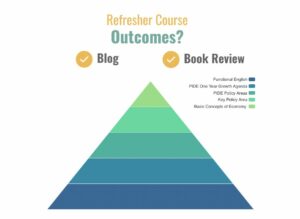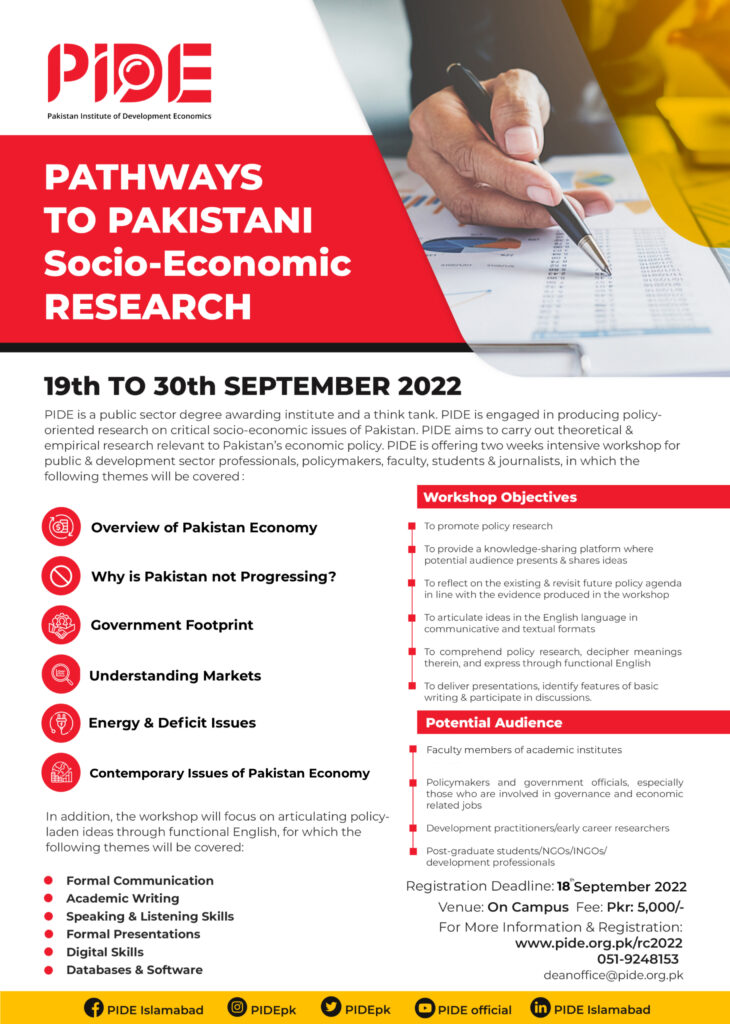Guidelines for Refresher Course for Faculty
PIDE is aspiring to start a 10-day refresher course on various economic current issues starting from September 19 – September 30, 2022. The Refresher course is conducted after one year. This course aims to provide the background & skills necessary for students as well as faculty members to participate positively in academic activities of the universities. Through this 10-day training, engaging learning techniques are imparted to ensure an environment where that is more conducive to learning.
This year refresher course will also cover functional English, academic writings, environment improvement and how students/practitioners can utilize the learnt English into policy writeups viz a viz different PIDE products like Policy briefs, working papers, Op-Eds, blogs etc.
Objectives:
- Touse visual aids for promoting students’ participation, interactive and joyful learning.
- Encourage the students to engage themselves in some free online basic courses (i.e., Coursera,).
- Creativity and Innovation in tasks and assignments is required.
- Build a reading list related to the course other than the course material to be taught during lectures, i.e., books, articles, reports, and videos.
- To Engage students in the PIDE Research Agenda
- Preparation of the PIDE Blog/Newspaper Article etc.
- Participation in the book review competition.
- To orient teachers in a specified subject and teaching techniques.
During the first three days of the course, the participants will be asked to give a topic. On the basis of which each participant will be allocated a mentor and it will be expected that by the end of course they produce a blog and the book Review.

Guidelines for Refresher Course for Faculty
PIDE is aspiring to start a 2-week refresher course on economics starting from end of September 19 – September 30, 2022. This document encapsulates guidelines and workplan of the faculty members who will be part of this course.
Guidelines
- All instructors are requested for the submission of the entire content till Sept 05, 2022.
- Every lecture will comprise of around 2 hour. The breakup of the session is attached in the table below.
- Contents on the PPT should be practical with practical examples. We need to have in mind that we will be catering students from diverse backgrounds having no knowledge of economics.
Contents to be covered
Course will highly focus on the ongoing socio-economic and governance issues of the country. Keeping in view following 10 key subject areas will be covered under the subject training program:
There are two parts of the course which will go hand in hand;
- Policy Research areas in light of PIDE Research
- Functional English
Policy Research areas in light of PIDE Research
Functional English
Policy Research areas in light of PIDE Research
1. Impediments in Growth
Pakistan need to undergo substantial reform effort, from colonial state to a development state, that is necessary for heightened economic activity, fostering a secure creative society and navigating complex rapidly changing, and networked global economy. Hence, there is need for stable democracy which can then nurture and enhance institutional capacities to complement help kick start and complement the economic activity.
Under the thematic area, following main topics will be covered:
- Stable Democracy – a pre-requisite for growth and development
- Developing the blueprint for Governance
- Judiciary for the contemporary times
2. Understanding Pakistan.Pakistan Population dividend
Pakistan has some of the greatest demographic opportunities for development in the world as a growing youth population enters adulthood. The demographic dividend can only be achieved with adequate investments in the education and skills of youth, harvesting the fruits of long-term human capital development. Similarly, Pakistan is a country with a population of 207 million people and a growth rate of 2.4%. A major portion of this population consists of youth.
Under the thematic area, following main topics will be covered:
- What Is the “Demographic Dividend”?
- Evolution of the Demographic Transition and the Demographic Dividend in Pakistan
- Socio-economic Implications of the Demographic Dividend for Pakistan
Policy Implications for Pakistan
3. What Is Productivity and Growth?
Increases in output can only be due to increases in the inputs to the production process, or to the efficiency with which they are used. Increases in inputs impose costs on society: increasing labor means having less leisure time; increasing investment in capital means lowering current consumption; and increasing material inputs reduces reserves of natural resources. Productivity growth is our opportunity to increase output without increasing inputs and incurring these costs.
4. Current Economic Crisis of Pakistan: Exchange rate, Foreign Exchange Reserves, IMF
Exchange rate, Foreign Exchange Reserves, IMF have always remained in new. Every two three years the country is midst of a twin crisis. So what are the reasons behind? Why are stuck in the vicious cycle? Why we go to IMF every two three years?
Under the thematic area, following main topics will be covered:
- Trade Deficit
- Exchange rate
- Current Account Deficit
- IMF Programs
5. Electricity Market in Pakistan
Electricity in Pakistan is generated, transmitted, distributed, and retail supplied by two vertically integrated public sector companies, Water and Power Development Authority (WAPDA) responsible for the production of hydroelectricity and supplied to the consumers by the power distribution companies (DISCOS) under the Pakistan Electric Power Company (PEPCO) . Currently there are 11 distribution companies and one National Transmission And Dispatch Company (NTDC) all in the public sector (except Karachi). There are around 42 independent power producers (IPPs) that contribute significantly in electricity generation in Pakistan.
As of 2016, more than 80% of its population on average has access to electricity
6. Tax Policy in Pakistan and Way Forward
According to World Bank Report Ease of Doing Business in Pakistan 2015, it takes 594 hours to pay taxes in Pakistan. Add to this, the responsibility of Withholding Taxes and burden on the tax compliance is just enormous. According to another World Bank Supported study: Paying Taxes 2015, out of 186 Countries surveyed, Pakistan ranked 172 in difficulty of tax compliance.
Under the thematic area, following main topics will be covered:
- Diagnosis
- History of Tax Reforms
- Strategy Plan – 2013-14 onwards
- The Way Forward
7. Introducing Logistics & Beyond
Like most other industries, transportation and logistics (T&L) is currently confronting immense change; and like all change, this brings both risk and opportunity. New technology, new market entrants, new customer expectations, and new business models. There are many ways the sector could develop to meet these challenges, some evolutionary, others more revolutionary.
8. Urban Mobility and Its Role in Development
Urban transport policy develops over time, as cities evolve and priorities change. Early focus on major investment for cars, in roads and parking. Advanced cities promote sustainable modes & high-quality streets: car use declines. There are ‘legacy’ issues in modelling and appraisal, linking back to car policies. Need to pay more attention to the wider socio-technical context of travel
- Mobility: A historical Account
- Mobility and Economy
- Travel time and Land Use
- Public Transit and TOD
9. Why Real Estate Market is not Functioning
Well-functioning markets are of supreme importance for sustainable growth and development of any country. As Ronald Coase states, “The property rights only say about the ownership of a product but it is the market that decides how the product will be used. Good markets are those that facilitate transactions in the best way possible. Hence, substantial immediate gains can be made if policy seeks to reform markets.
Under the thematic area, following main topics will be covered:
- Developing Real Estate Market
- Agriculture Market: Challenges and Opportunities
- Discussion on Energy Market
10. Social Security Initiatives in Pakistan
Many countries have implemented transfer programs that seek to target beneficiaries: that is, to identify who is poor and then to restrict transfers to those individuals. Pakistan has launched many programmes in this domain; the most recent ones being Benazir Income Support, Sehat Sahulat and now eventually transformed into Ehsaas – the biggest and boldest programme ever launched in Pakistan to uplift marginalized people. Ehsaas is unique because of its scope, multi-sectoral character. breadth and depth, process of formulation, governance and integrity policy, institutional arrangements and scale of funding. This session will try to analyze how such social protection schemes work and how they impact the lives of the targeted audience, if at all.
11. Cities of the future
Cities drive world GDP. At least 80 percent of world GDP comes from cities. They have been the cradle of civilizations as well as progress since civilization began. Pakistan, at 220 million people, is not even 0.34% of world GDP. Hong Kong, a city of 7.4 million people, has a larger GDP contribution than Pakistan’s (0.43%). Clearly, Pakistani cities are lacking in terms of contribution to GDP and growth. Hence, there is need for developing cities on modern lines.
Under the thematic area, following main topics will be covered:
- Cities of the future
- What is smart about smart cities?
- Wealth of cities
- Master Planning – what it is and what it creates?
- Urban Development
12. Pakistan Research Paradigm - How PIDE is transofrming it?
PIDE has been working on most of important policy-research areas through its different products like blogs, working papers, articles, monographs, surveys, etc. On top of that PIDE is leading the effort in creating the largest social sciences research network in Pakistan through its RASTA’s by develop a research culture and network of academia and think tanks across Pakistan producing high-quality, evidence-based policy research to inform Pakistan’s public policy process. RASTA seeks to develop local thought communities and generate knowledge which is local and fulfil the policy research gaps.




